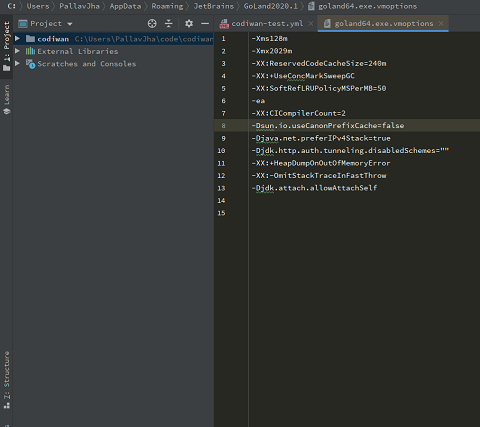
The debugger is great but pretty clunky if you are coming from the world of Visual Studio or any other "point and click" debugger.
#Goland free manual#
It has great potential but it's light years away from providing the same amazing support they have for Java, Kotlin and Python.ģ) Vim with vim-go: amazingly responsive, provides most of the functionality of VSCode, but everything is a bit more manual and you have to be used to the "Vim way". Using vgo right now is a bit of a hack.Ģ) Goland: adds some refactoring help on top of VSCode, and now has support for vgo, but it costs money and it's pretty damn slow. Doesn't provide super advanced features, but it provides enough through third party tools (like code navigation, "implement interface", "rename symbol", great linting, etc.). Goland is good, like anything else JetBrains produces, but to be honest it doesn't provide enough for me to justify the price over VSCode.ġ) VSCode: free, great functionality, pretty responsive. My two cents: depends on where you are coming from and what your price point is.

Please keep in mind, this is for 1st party postings only. To avoid too much noise from companies, please post job openings there. We have a monthly "Who's Hiring?" post that will stay pinned to the top of the subreddit.
#Goland free how to#
Do Not Post Pirated Materialĭo not post links to or instructions on how to get pirated copies of copyrighted material.
#Goland free software#
We ask that you not post about closed-source / paid software that is not specifically aimed at Go developers in particular (as opposed to all developers), even if it is written in Go. This includes: - Articles about the language itself - Announcements & articles about open source Go libraries or applications - Dev tools (open source or not) specifically targeted at Go developers Posts must be of interest to Go developers and related to the Go language. Treat everyone with respect and kindness. Follow the Go Code of ConductĪs a part of the Go community, this subreddit and those who post on it should follow the tenets laid out in the Go Code of Conduct: Take responsibility for your words and actions, including their consequences, whether intended or otherwise. Avoid snarking (pithy, unproductive, sniping comments) Avoid discussing potentially offensive or sensitive issues this all too often leads to unnecessary conflict. Avoid unconstructive criticism: don't merely decry the current state of affairs offer-or at least solicit-suggestions as to how things may be improved. Be constructive.Īvoid derailing: stay on topic if you want to talk about something else, start a new conversation. When we do disagree, try to understand why. Interpret the arguments of others in good faith, do not seek to disagree. In particular, respect differences of opinion.

Remember that sometimes it is best to refrain entirely from commenting. Think about how your words will be interpreted. Productive communication requires effort.

(Meaning and tone can be lost in translation.) 3. Remember that people have varying communication styles and that not everyone is using their native language. Post is not in keeping with an inclusive and friendly technical atmosphere.


 0 kommentar(er)
0 kommentar(er)
